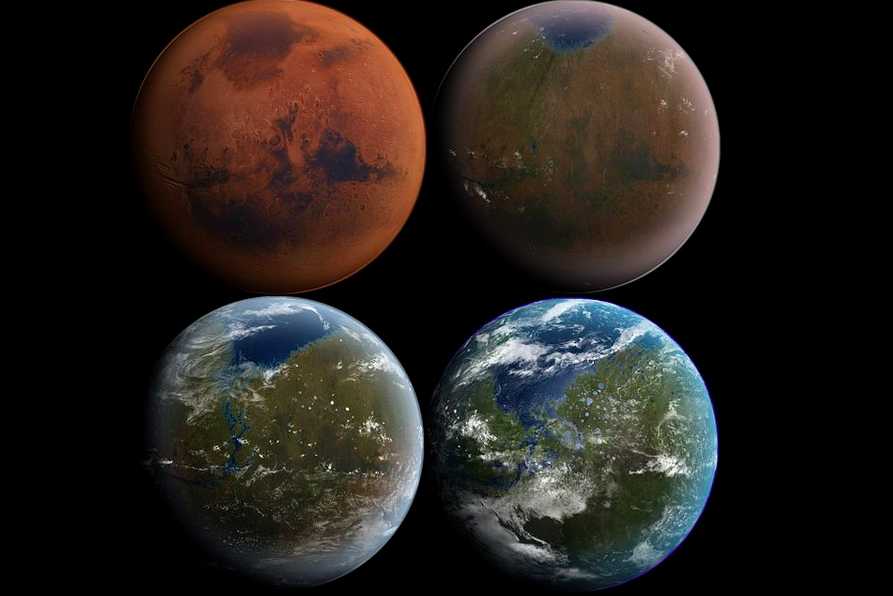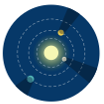The Exploration and Potential Settlement of Mars 12 hours
This course will examine how our perceptions of Mars have evolved over time, how popular depictions of humans to Mars have changed, and what the future could hold for Martian settlers!

The Exploration and Potential Settlement of Mars
The planet Mars has been a source of fascination for human beings since time immemorial. For millennia, its path across the night sky has been tracked and recorded by observers, inspiring mythological, cultural, and astronomical traditions that are still alive today. Over time, our knowledge of the planet, and its similarities and difference with Earth, have evolved considerably. For more than a century, scientists have speculated about the possibility of life there, and whether or not humanity will visit there someday. For over sixty years, we’ve sent robotic missions there. In a little over a decade, we’ll be sending crewed missions as well. Someday, we might even establish a permanent human presence there, thus fulfilling the dream of countless generations of dreamers. With the right strategies, technology, and a huge commitment in terms of time and resources, Mars’ nickname (“Earth’s Twin”) could take on a whole new meaning!
12 hours
Reading/Viewing for the Course:
- The Greening of Mars, by James Lovelock (1968)
- The Case for Mars, by Robert Zubrin. Free Press (1996, 2011)
Learning Objectives
Students will come away from this course with a greater understanding of Mars’ enduring place in our cultural, mythological, and astronomical traditions. They will also learn of how our perception of Mars has changed considerably over time, especially where questions of its potential habitability are concerned and whether it once supported life (and may still today). They will also leave with a greater understanding of how these perceptions have shaped the many proposals for crewed missions since the dawn of the Space Age. Lastly, they will understand how our growing understanding of “Earth’s Twin” has brought us to the point where we are contemplating whether a permanent human presence can be established there someday.
Course Outline
This course will examine how our perceptions of Mars have evolved over time, how popular depictions of humans to Mars have changed, and what the future could hold for Martian settlers!
Session 1: Popular Perceptions and Portrayals
A review of how our perceptions of Mars have evolved due to our growing awareness of the cosmos:
- Mars in ancient astronomical/astrological traditions (fire and strife)
- Galileo and the first telescopic observations
- Giovanni Schiaparelli and the first detailed map of Mars (“Martian Canals”)
- Speculation about life (seasonal changes, polar ice caps)
- Robotic exploration, Soviet probes (1960 to 1969), Mariner probes, Viking orbiters/landers
- Modern robotic missions and the search for life
- Crewed missions by the 2030s
2 Hours
Session 2: History of Proposals
A review of the many proposals for crewed missions to Mars, from mid-century to the present (and the near future):
- Von Braun’s “The Mars Project”
- Cold War Era proposals (NASA Orion, EMPIRE; Soviet MPK, TMK)
- Mars Direct (Robert Zubrin)
- The Constellation Program (Ares rockets and CEV)
- The Moon to Mars and Artemis (SLS and Orion)
- Gateway, Deep Space Transport, Mars Base Camp (2030s)
2 Hours
Session 3: Mars in Science Fiction
- Early speculations about life in fiction
- War of the Worlds (1897), a Princess of Mars (1912), Last and First Men (1930)
- Trope of Martian civilization and hostile invaders
- 1950s-1960’s “Golden Age of Sci-Fi,” (Bradbury, Clarke, Asimov, Heinlein, Dick)
- 1970s, scientific discoveries (Mars is lifeless), humans will be future “Martians”
- Modern-day renewed interest and search for life
- New stories of exploration, space settlement, and terraforming (The Martian, Robinson’s Mars series, etc.)
2 Hours
Session 4: Getting There
- A review of the challenges and solutions for the first step in getting to Mars
- Proposed missions to Mars by the 2030s, NASA and China
- Launch windows every 26 months (Mars Opposition)
- Space radiation, waste, microgravity, 6 to 9-month transit
- Nuclear thermal/nuclear electric propulsion (90 days or less)
- Direct or indirect missions (space stations at both ends)
- NASA plans (SLS, Orion, Gateway, DST, Mars Base Camp)
- Space X and Space Settlements (Starship, regular trips, first Martian City)
2 Hours
Session 5: Living There
There are many hazards waiting for us on Mars that will make establishing a foothold very challenging. Special attention will be given to:
- Surface radiation, extreme cold, dust storms, and lower gravity
- Habitation modules, surface, subsurface, ice palaces, cities
- Power, solar, wind, sterling and kilowatt nuclear reactors, fusion reactors
- In-Situ Resource Utilization (ISRU), regolith, and ice (air, water, food, building materials)
- Location dependent, Valles Marineris, Hellas Basin, Argyle Basin, Northern Lowlands (Mars City Design)
- Economy built on local industries (manufacturing, metals, deuterium)
2 Hours
Session 6: Making a Garden
For decades, scientists have speculated how an ecological transformation could be engineered on Mars to make it more Earth-like (aka. terraforming):
- Multiple examples in fiction, The Greening of Mars (1968), Mars Trilogy (1992-1996) foremost
- Long history of scientific studies, Cole “Islands in Space,” Sagan, and NASA “ecosynthesis” study
- Three main steps: warm up the planet, melt the ice caps, thicken the atmosphere
- Methods include orbital mirrors, impactors, introduction of super greenhouse gases (SGGs), nuclear detonators
- Over time, introduce plant life to the surface, create a water cycle, convert the atmosphere
- Long term, human habitation would still be challenging, but feasible
2 Hours
Instructor Biography
I was born in Canada’s capital of Ottawa, Ontario, in 1978. Since my formative years coincided with the 1980s and 90s, I witnessed the era of Star Wars, Star Trek, the Space Shuttle, and the Hubble Space Telescope. From an early age, I found myself fascinated with space, astronomy, and the possibility that humanity might travel and live out there someday. I also very much enjoyed the exploration of humanity’s future in space through science fiction and developed a keen interest in the genre before I became an adult. I also knew that I had a passion for knowledge and enjoyed sharing that with others.
This latter passion led me to become a teacher by 2004 when I still lived in Ottawa. Two years later, I moved to beautiful British Columbia, where I now live with my wife and family. It was here, in 2010, that I met Fraser Cain, the publisher of Universe Today. While I was fascinated with his publication, Cain was fascinated with the fact that I was an aspiring science fiction writer, as well as a teacher of history and English to high-schoolers. He took it upon himself to nurture my interests and eventually hired me to become a writer with Universe Today and HeroX.
Between 2015 and 2022, I expanded my professional base by quitting teaching to write for Universe Today full-time. I joined multiple education and outreach organizations (The Royal Astronomical Society of Canada, Enterprise in Space, Mars City Design, and more), began delivering lectures locally, and began writing for other publications. Foremost among them is Interesting Engineering, which I joined in 2019.
By 2015-16, I also gained the attention of publishers interested in my ideas for science fiction books that explored the themes I wrote about professionally. These included Earth science, astronomy, space travel, terraforming, and the possibility that humanity will expand into space someday. Between 2017 and 2020, I had three novels published by Castrum Press and plan to write many, many more, if possible!
As of 2022, I also became a podcaster whose show – “Stories from Space” – was picked up by ITSP Magazine. This show explores the history of spaceflight, astronomy, astrophysics, cosmology, and the deeper questions about our existence. Questions like “How did it all begin?”, “Where are we going?”, and “Are we alone in the Universe?”
I’m proud to be joining the Kepler Space Institute and am looking forward to sharing my passion for space, education, and the pondering of the deeper questions with students!
Matthew Williams
Instructor
Matthew S. Williams is a space journalist and science communicator who writes for Universe Today and Interesting Engineering. In his spare time, he makes podcasts and writes hard science fiction novels, three of which have been published. His articles have appeared in Phys.org, Popular Mechanics, Business Insider, HeroX, Science Alert, Real Clear Science, and Gizmodo. He lives on Vancouver Island with his wife and family.
FAQs
Who can enroll?
When do courses start?
Will the sessions be recorded?
How do I take a course?
What are the requirements to become a student?
The platform is available on desktops and mobile devices. Please have your mic and camera ready to participate. Develop new skills and gain new experiences as you learn alongside others building humanity’s future in space.



